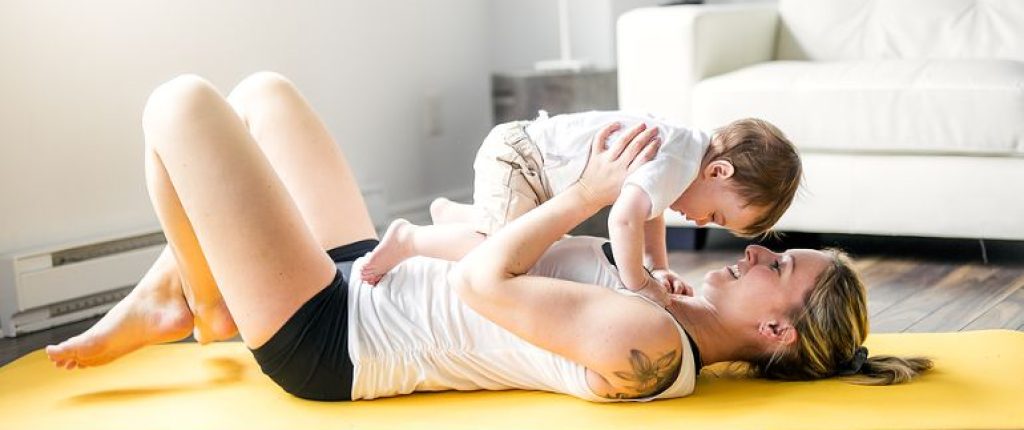Physical therapy plays a vital role in postpartum fitness, offering new moms both the guidance and support needed for postpartum recovery and core strengthening after childbirth. Pregnancy brings about significant changes in a woman’s body, particularly affecting areas like the pelvic floor and core. Postpartum physical therapy focuses on helping moms rebuild strength, improve function, and regain confidence in their bodies.
Understanding Postpartum Recovery Needs
Every woman’s postpartum journey is unique, but common challenges often arise as the body recovers from pregnancy. That’s why it’s important for your postpartum physical therapy plan to be tailored to your individual needs.
- Pelvic Floor Health: Pregnancy and delivery can weaken pelvic muscles. A strong pelvic floor is crucial for bladder control, sexual function, and core stability.
- Core Stability & Strength: The abdominal muscles stretch during pregnancy to accommodate the growing baby, often leading to a condition known as diastasis recti, where the muscles separate. Rebuilding these muscles is essential for overall health and stability.
- Postpartum Depression: Both physical and emotional factors can contribute to postpartum depression. Exercise, including targeted physical therapy, can be an effective tool to help manage symptoms.
- Surgical Birth Recovery: Having a cesarean birth can limit your movements and be painful, and your doctor may prescribe post-surgical rehabilitation physical therapy to help you heal.
The Importance Of Pelvic Floor Strengthening After Birth
A well-functioning pelvic floor supports the organs, controls urinary and bowel functions, and enhances core stability. Physical therapists can design personalized pelvic floor strengthening exercises to help new moms regain the control and strength that many of them have lost after giving birth.
- Prevention Of Incontinence: Strengthening exercises help avoid urinary incontinence, a common postpartum issue.
- Improved Sexual Health: A strong pelvic floor can lead to improved sexual satisfaction and function.
- Core Stability: As part of postnatal core recovery, exercises targeting the pelvic floor also contribute to overall core strengthening.
Core Exercises After Pregnancy
Restoring the core is a central focus of postpartum physical therapy. Specialized exercises help moms rebuild their core after pregnancy without risking injury.
- Diastasis Recti Healing: Gentle movements bring the abdominal muscles back together.
- Safe Postpartum Workouts: Physical therapists ensure exercises are safe and effective for postpartum recovery.
- Functional Strength: Encouraging everyday movements to become easier and less taxing.
Core Exercises To Include In Postpartum Fitness
These exercises support the strengthening of the core and pelvic floor in a safe and effective manner. It’s essential to consult a physical therapist to ensure these exercises are performed correctly and adapted to individual needs.
- Pelvic Tilts
- Kegels
- Bridges
- Modified Planks
- Breathing Exercises
The Role Of A Physical Therapist In Postpartum Recovery
Physical therapists provide vital support in postpartum recovery, guiding new moms through the challenges of restoring their body’s physical health.
- Personalized Exercise Plans: Tailoring exercises to individual needs, considering any complications or physical limitations.
- Emotional Support: Offering encouragement and understanding, especially for moms facing postpartum depression or anxiety.
- Education: Teaching proper techniques to prevent injury and maximize the benefits of exercises.
- Progress Monitoring: Adjusting programs as the mom’s strength and abilities improve.
Benefits Of Physical Therapy For New Moms
Just like having physical therapy during pregnancy, engaging in postpartum physical therapy offers several benefits for new moms navigating postpartum fitness.
- Improved Quality Of Life: Reducing pain and discomfort so moms can enjoy daily activities.
- Faster Recovery: Targeted exercise programs can accelerate healing and improve overall recovery timelines.
- Increased Energy Levels: Regular exercise can boost energy, essential for keeping up with a newborn.
- Relieve Pain Related To Pregnancy: Low back pain is a frequent issue that new moms deal with both during and after pregnancy.
Addressing Postpartum Depression Through Physical Therapy
Women experiencing postpartum depression or mood changes may also find relief through physical therapy. Exercise can spur the release of endorphins, which are natural mood elevators.
- Building a Routine: Establishing a routine can provide structure and create a sense of normalcy during a tumultuous time.
- Positive Community: Joining a group physical therapy class can develop a support network, sharing experiences with other new moms.
FAQs
When Should I Start Postpartum Physical Therapy?
It’s advisable to consult with a physical therapist as soon as you feel ready post-delivery. They can assess your situation and determine an appropriate start for your therapy.
How Long Does Postpartum Recovery Through Physical Therapy Take?
Recovery time varies based on individual circumstances, including delivery type, any complications, and personal health history. Consistency with prescribed exercises, though, plays a significant role in speeding up recovery.
Can Physical Therapy Help With Breastfeeding-Related Posture Issues?
Yes, physical therapists can help correct posture issues that often arise due to the sustained positions taken during breastfeeding, potentially easing back and neck pain.
Embracing Postpartum Fitness With Confidence
Physical therapy is an empowering tool that can greatly assist new moms in reclaiming their physical and mental well-being after childbirth. It offers the path to stronger pelvic health, improved core stability, and a more positive postpartum experience.
If you’re ready to embrace the benefits of postpartum physical therapy, Centennial Sports & Physical Therapy in Centennial is here to support and guide you every step of the way. Reach out and start your journey towards a healthier, more confident you.


